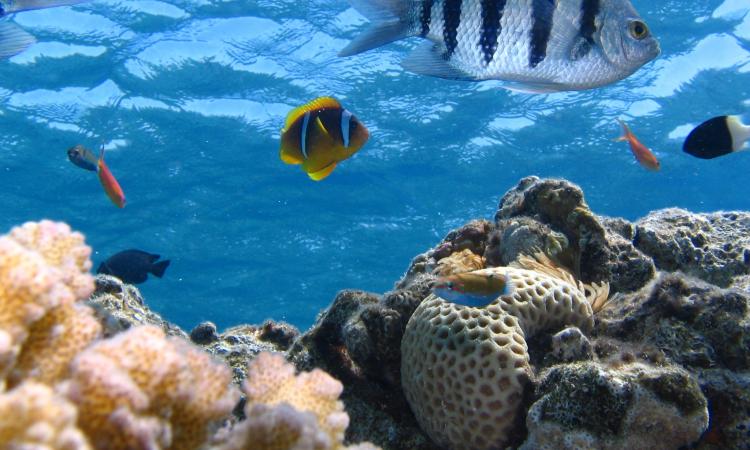
Limited understanding of basic ocean processes is hindering progress in marine carbon dioxide removal, with the on-going commercialisation of some approaches “premature and misguided”.
In a new paper, scientists from the University of East Anglia (UEA), the University of Tasmania’s Institute for Marine and Antarctic Studies, Centre National de la Recherche Scientifique, and the Institute for Sustainable Development and International Relations, review the climatic effectiveness of four 'nature-based' techniques using marine biological processes.
These involve shellfish cultivation, seaweed farming, coastal blue carbon - using the restoration of seagrass, saltmarsh and mangrove forests - and increasing whale populations through ‘re-wilding’. Writing in the journal Environmental Research Letters, they conclude that while these activities are highly worthwhile for their non-climatic benefits, they cannot provide a significant contribution to carbon dioxide removal (CDR) and risk being ‘dead ends’ in terms of meaningful climate mitigation.
To limit warming to less than 2°C requires both emissions reductions and CDR, and a diverse range of potential approaches have been proposed to achieve billion-tonne annual CO2 removal rates within 30–50 years, with multiple techniques needed to be developed and up-scaled massively to achieve that goal.
However, the researchers argue that new methods are being proposed regularly with insufficient checks or balances. This is particularly true for ocean-based CDR, which is now attracting greater interest as the constraints on land-based methods become apparent.
Seaweed has been proposed as a tool for capturing carbon dioxide from the atmosphere. However, large-scale seaweed farming for this purpose faces significant challenges.
Firstly, expanding seaweed cultivation massively, especially into the open ocean, is not practical with current technology. Many seaweed species struggle to grow in offshore environments due to lack of essential nutrients. Secondly, unlike trees, seaweed doesn't store carbon long-term. Once the seaweed dies, the carbon re-enters the ocean food web. Capturing carbon would require expensive and complex tracking of the seaweed's fate to ensure long-term storage.
Despite these limitations, seaweed farming remains valuable for other reasons. It provides food and habitats for marine life, supports coastal communities, and offers various commercial products.
The ocean-based approaches reviewed are, in the authors’ opinion, being advocated not only by scientists, but also in many cases by the private sector, without due diligence on the underpinning fundamental science.
Coastal ecosystems like seagrass meadows and mangroves store large amounts of carbon. This has led to proposals for using them for carbon capture and storage (CDR). While these ecosystems do store more carbon per unit area than land forests, simply storing carbon isn't enough for climate mitigation. We need to remove carbon from the atmosphere, not just store what's already there.
Large-scale restoration of these ecosystems faces challenges. Firstly, coastal areas are often used for development or agriculture, making full restoration difficult. Secondly, the natural contribution of these ecosystems to carbon removal is relatively small. Even with significant restoration, the impact on global climate would be limited. Finally, accurately measuring the carbon capture benefits of restoration is complex and expensive.
Despite these challenges, restoring coastal blue carbon ecosystems is still important. They provide vital benefits like coastal protection, pollution control, and support for biodiversity and food security.
“Proponents of these methods have an incomplete or incorrect grasp not only of how the ocean carbon cycle functions, but also of the massive upscaling needed to provide significant climatic benefits,” said co-author Dr. Phil Williamson, honorary associate professor at UEA’s School of Environmental Sciences.
“Such upscaling brings other ocean processes into play that could cancel out the effectiveness of the proposed CDR approach. In each case, misunderstanding and knowledge gaps affect the credibility of carbon offset schemes.”
Lead author Prof Philip Boyd, of the University of Tasmania’s Institute for Marine and Antarctic Studies, said: “We consider that the non-climatic benefits of all these actions have potential to greatly exceed their modest, or non-existent, possible contributions to ocean-based CDR.
Ocean ecosystems face threats like biodiversity loss and overfishing. Rewilding efforts aim to restore whale populations to their historical abundance, which would benefit the whole ocean. However, some focus on whales purely for their potential to store carbon dioxide. While whale waste might help some plants grow and capture carbon, the overall impact on carbon storage remains unclear and potentially small.
“Those advocating these approaches have given insufficient attention to basic constraints relating to ecosystem functioning and the ocean carbon cycle, for example, ignoring the many processes returning CO2 to the atmosphere, as well as the challenges of implementation at climatically-significant scale, the (in)security of carbon storage and the many difficulties in reliable quantification of climatic benefits.
“There is a need for better communication of the basic criteria for CDR viability using marine processes. Safety, durability, verifiability and scalability should be used to prioritise relevant R&D funding by Governments, as well as providing checks and balances for policymakers.”
The authors raise concerns over the ‘opportunity costs'—the resources directed at these approaches—which they say could be better invested in reducing emissions, as well as other CDR methods, both land- and ocean-based, that are more likely to be safe, sustainable, durable, verifiable, and scalable.
Dr Williamson added: "We believe that the use of these four nature-based approaches for carbon offsets is more likely to represent greenwashing, rather than these methods becoming the ‘climate heroes’ that some people are claiming."
‘Limited understanding of basic ocean processes is hindering progress in marine carbon dioxide removal’, PW Boyd, J-P Gattuso, CL Hurd, P Williamson, is published in Environmental Research Letters on June 6, 2024. The full paper is available here
About the University of East Anglia
The University of East Anglia (UEA) is a UK Top 25 university and is ranked in the top 50 globally for research citations. Known for its world-leading research and good student experience, it was awarded Gold in the Teaching Excellence Framework and is a leading member of Norwich Research Park, one of Europe’s biggest concentrations of researchers in the fields of environment, health, and plant science. www.uea.ac.uk
/articles/misguided-ocean-carbon-capture-hype-outweighs-science